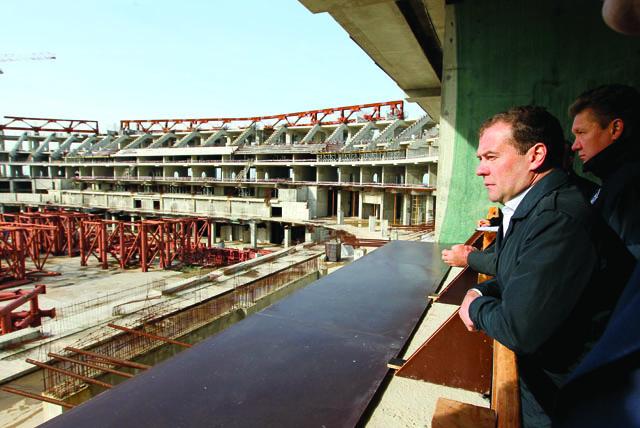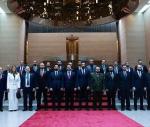LONDON — What if they held an Olympics and nobody came?
The situation isn’t that bleak, of course, for the Sochi Games. Yet, with less than three weeks to go until the opening ceremony, hundreds of thousands of tickets remain unsold, raising the prospect of empty seats and a lack of atmosphere at Russia’s first Winter Olympics.
There are signs that many foreign fans are staying away, turned off by terrorist threats, expensive flights and hotels, long travel distances, a shortage of tourist attractions in the area, and the hassle of obtaining visas and spectator passes.
“Some people are scared it costs too much and other people are scared because of security,” senior International Olympic Committee member Gerhard Heiberg of Norway told The Associated Press. “From my country, I know that several people and companies are not going for these two reasons. Of course, there will be Norwegians there but not as many as we are used to.”
Sochi organisers announced last week that 70 per cent of tickets have been sold for the games, which run from February 7-23 and represent a symbol of pride and prestige for Russia and President Vladimir Putin.
So what about the remaining 30 per cent?
“We are keeping a special quota for those who come for the games, so that they can indeed buy tickets for the competitions,” organising committee chief Dmitry Chernyshenko said.
Chernyshenko said about 213,000 spectators are expected at the games, with about 75 per cent likely to be Russians.
“Tickets are being snapped up fast with the most popular events being hockey, biathlon, figure skating, freestyle and snowboard,” the organising committee said in a statement to the AP. “With 70 per cent of tickets already sold and another ticketing office opening shortly, we are expecting strong last-minute ticket sales and do not envisage having empty seats.”
Sochi officials have refused to divulge how many tickets in total were put up for sale, saying the figure would only be released after the games.
However, according to IOC marketing documents seen by the AP, Sochi had a total of 1.1 million tickets on offer. That would mean about 300,000 tickets remained available.
By comparison, 1.54 million tickets were available for the 2010 Winter Olympics in Vancouver and 97 per cent (1.49 million) were sold. For the 2012 Summer Games in London, organisers sold 97 per cent (8.2 million) of their 8.5 million tickets.
Heiberg, who chairs the IOC marketing commission, said the Russians have cut down by 50 per cent on the number of spectators originally planned for the mountain events for security reasons.
“That means there will be less people and probably less enthusiasm than we had, for instance, in Lillehammer,” he said. “I hope the Russians will fill not only their indoor stadiums but there will be enough people in the stadiums for the Nordic events.”
Heiberg organised the 1994 Lillehammer Winter Olympics, which stood out for the colorful atmosphere generated by passionate Norwegian fans.
Sochi’s ticket sales began in February 2013, a year before the games. Tickets have been sold on Sochi’s official website on a first-come, first-served basis. Box offices are now open in Moscow and Sochi.
The cheapest tickets go for 500 rubles ($15), the most expensive for 40,000 rubles ($1,200). More than half of all tickets cost less than 5,000 rubles ($150). The average monthly salary in Russia is 30,000 rubles ($890).
The one and only authorised ticket office in Sochi was busy on a recent afternoon, with three dozen people lining up at what once was a waiting room at the city’s railway station. Many, however, complained that all the cheap tickets were already gone.
“Prices leave much to be desired, but what can you do?” said Sochi resident Yana Ivolovskaya, who bought two tickets for bobsled for 2,000 rubles ($60). “We’re not going to get another Olympics in Sochi so I thought I should go.”
Fans outside Russia buy tickets from authorised dealers appointed by their national Olympic committees.
Attracting foreign visitors has been a challenge amid all the headlines about Russia’s law banning gay “propaganda”, human rights issues and — particularly — the risk of terrorism.
Back-to-back suicide bombings killed 34 people last month in Volgograd, about 640 kilometres from Sochi. On Sunday, an Islamic militant group in Russia’s North Caucasus claimed responsibility for the bombings and posted a video threatening to strike the Sochi Games.
CoSport, the official ticket reseller in the United States and six other countries, said the Sochi Games generated “good demand” for tickets and packages.
“We experienced demand at expected levels,” spokesman Michael Kontos said, without giving figures.
Flights to Sochi are expensive, and most international travellers have to go through Moscow, with direct flights to Sochi only available from Germany and Turkey.
Western travellers must navigate the time-consuming visa process and requirement to obtain a “spectator pass” along with their tickets. This requires providing passport details that allow authorities to screen all visitors.
“What we are hearing is that the bureaucratic complexity, with spectator passes and visa and so on, is what scares off fans, more than worries about security,” Austrian Olympic Committee spokesman Wolfgang Eichler said.
Jan Serenander, managing director of Jet Set Sports in Norway, cited a lack of tourist attractions in the Black Sea resort.
“When Sochi was announced no one had even heard of the place,” he said. “They had to get out their atlases.”
Die-hard winter sports fans, however, will not be discouraged. Orange-clad speedskating fans from the Netherlands are always among the most visible spectators at any Winter Games.
“I expect it to be orange,” Jeroen de Roever, manager of official Duch ticket seller ATPI, said of Sochi’s speedskating venue. “We have been sold out for quite a while.”

















